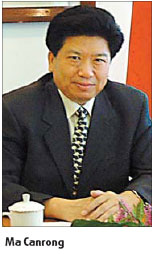Common interests, opinions mark ties
German Chancellor Angela Merkel arrived in Beijing yesterday, marking the beginning of her four-day visit to China.
During her trip, Merkel will inaugurate a series of German cultural activities, to be held in the country from 2007 to 2010.
Merkel's visit, along with that of German President Horst Koehler in May and President Hu Jintao's meeting with the German Chancellor in Heiligendamm in June, is a testament to the deepening relationship between the two nations.
"Such frequent high-level exchange of visits is sure to bolster mutual trust and bring the already positive bilateral relations up to a new level," said Ma Canrong, Chinese ambassador to Germany. With common interests and identical opinions on broad international issues, the two countries, both of which hold significant global influence, are expected to contribute more to the world, he said.
The German government pursues a "One China" policy and supports China's efforts for reunification, which lays a solid political basis for the growth of bilateral relations, Ma noted.
"With a growing trend of political diversification and economic globalization, exchanges between the two countries in various fields are expected to intensify further," he said, predicting a promising future for Sino-German relations.

Bilateral trade is healthy and balanced as a whole, with China enjoying favorable balance of trade for goods, while Germany has a trade surplus in the services sector, he said.
Ma noted: "The Chinese government has formulated a series of policies in a bid to further increase imports."
The measures aimed at spurring imports include adding a new import promotion section at the China Import and Export Fair, a biannual trade event held in South China's Guangdong Province in April.
Chinese authorities concerned are currently exploring the possibility of holding a "German products fair" in China, seeking to increase imports, especially that of high value-added hi-tech German products, and also to encourage heightened cooperation in environmentally friendly technologies and renewable energy.
In investment terms, bonds between the two countries have grown stronger in recent years.
Ma said that investment attraction, which is foremost among the main duties of his embassy, has made progress. Statistics from the Chinese embassy in Germany show that 5,338 German projects with a total investment value of $13.4 billion were set up in China by the end of 2006.
Meanwhile, against the backdrop of the dramatic growth of China's economy, the nation's entrepreneurs have begun to explore foreign options, resulting in an upswing in Chinese investment in Germany, said Ma.
He also noted that both nations had made substantial progress with respect to legal cooperation. In the bilateral agreement on legal cooperation signed in 1999, civil and commercial laws are listed as priorities for exchange.
Accordingly, the two countries have conducted six annual State-level dialogues on legal cooperation since 2000.
In addition, related academic seminars, regular meetings of experts and professional training have also contributed to bilateral understanding, Ma said.
Recent years have witnessed increasing cooperation in intellectual property rights (IPR) protection between the two countries.
Among other activities, IPR seminars jointly held by both sides, a four-year IPR law enforcement training program and the intensification of Chinese efforts to crack down on piracy have eased German companies' concerns over China's business environment and further promoted the development of bilateral economic ties.
Closer cultural bonds
"As one of the earliest countries to value cultural promotion abroad, Germany regards its overseas cultural policies a part of national diplomatic policies," Ma said, adding that Germany's cultural promotion abroad plays a key role in expanding its global economic and political influence.
While Germany has launched a three-year comprehensive cultural campaign entitled "Germany and China-Moving Ahead Together", seeking to give Chinese people an opportunity to know more about Germany, China is exploring more avenues to showcase its historical civilization and modern development to the German public.
"Germans have a strong interest in traditional Chinese history and culture," Ma said. "With China's rise, more interest has been shown in China's contemporary society."
A Chinese cultural center is being set up in Berlin in accordance with a bilateral cultural agreement signed in 2005.
Through various activities such as exhibitions, lectures, movie screenings and library facilities, the center - expected to be opened to the German public within this year - aims at helping them develop a better understanding of China.
Following Germany's participation in the Beijing International Book Fair as a Country of Honor this year, China is also set to be accorded the same distinguished status at the prestigious Frankfurt Book Fair in 2009.
Ma also revealed that the Chinese government plans to observe a Year of China in Germany in the near future, to help boost understanding between the two peoples.
(China Daily 08/25/2007 page1)














